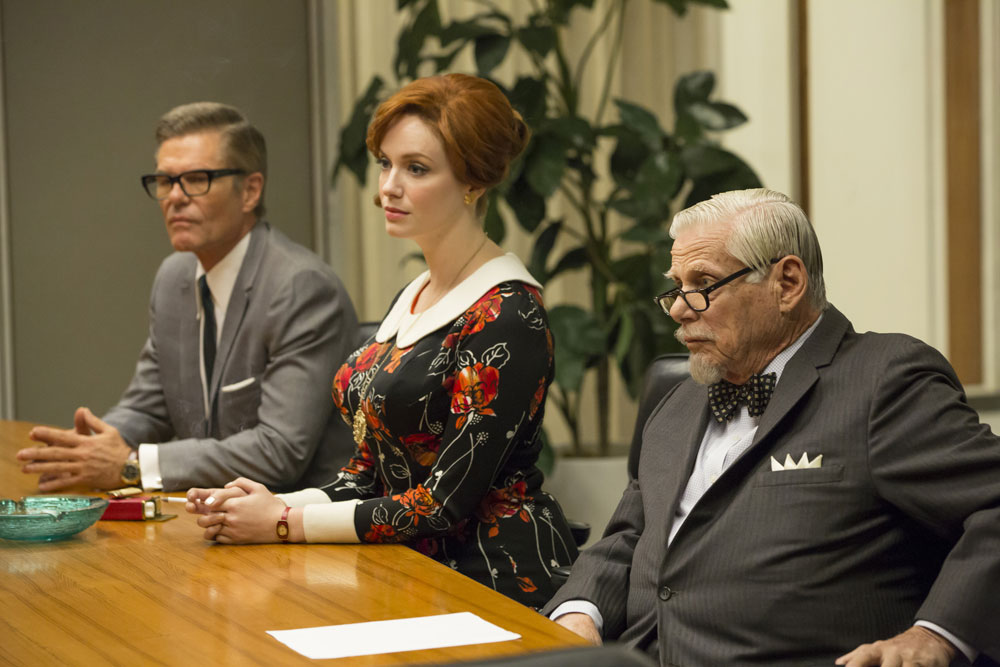 Harry Hamlin, Christina Hendricks, and Robert Morse in AMC’s “Mad Men”
Harry Hamlin, Christina Hendricks, and Robert Morse in AMC’s “Mad Men”
Usually, the last thing we do before publishing our Monday morning Mad Men review is scramble to find out what the title of the episode is so we can put it in the header. We can’t tell you how many times we went to hit “Publish” only to exclaim, “Oh, right! The title!” This time, for whatever reasons, we looked it up before writing this review and found to our surprise that the title wasn’t “Judgment Day,” because it sure felt like it. There wasn’t a character in the story who wasn’t judging someone else – and usually fairly harshly, from Joan’s somewhat surprising bitterness toward Don right on down to Betty having opinions about middle school teachers who don’t wear bras.
Then again, we suppose “Field Trip” works too, not just because of Bobby and Betty’s little foray into rural New York, but because Don makes an unscheduled day trip out to L.A. (which goes just as disastrously as Betty’s field trip) and later is forced to camp out in the office like a visiting child or a dignitary no one knows what to do with.
Regardless of the title, this episode was all about consequences and disappointment; two things Don has spent his entire adult life trying to avoid. We’ve been watching him live his life for almost a decade of story time now and it’s long past time for the piper to be paid. But like a lot of the audience, we squirmed a bit at the prospect, getting just a bit annoyed with all the people who wanted their pound of flesh this episode, even though they’re more than entitled to it.
Consider Peggy. Don elevated her to a copy position, sure. And he was there at the lowest point in her life, bestowing his own empowering-yet-dysfunctional mantra on her and changing her life forever: “It will shock you how much this never happened.” But after that, he routinely undervalued her and treated her badly, his abuse culminating in a humiliating moment where he literally threw money at her in front of her work colleagues. She did exactly what he taught her to do: she got out of that mess and went on to forge her own destiny out from under his shadow. Within a year, she was not only back under his shadow due to his own manipulations, but stuck between two mentors, both of whom were either ignoring her or using her in their little war against each other. In the end (and this is what makes it disappointing to us), her anger mostly came down to how Don treated Ted, the married boss she was having an affair with. In other words, Peggy had a lot of reasons to be mad at Don, but she settled on the one that casts her in the worst light. “You’re a monster for driving my married lover away from me and into the arms of his family!”
Consider Joan. Don’s always had her back and she was grateful to him for trying to talk her out of sleeping with the Jaguar guy, but she worked hard on the plan to take the agency public, which he scuttled with one temper tantrum, rendering all her work (both rewarding and humiliating) completely worthless. She bounced back by landing the Avon account and essentially promoting herself to Account Rep, but it seems to us that all her insecurities about that one act and how it made her look in the eyes of the men around her are being laid – somewhat unfairly – at Don’s feet. While it was nice for him to show up at her apartment that night to talk her out of it, his subsequent actions only made her more ashamed about what she did. He attempted to rescue the one woman he knows who hates the idea of being rescued and she kind of resents him for it now.
Ironically, both Joan and Peggy’s anger has its roots in Don’s reckless idea to merge with CGC, creating a new status quo that each woman is now trying to protect. “Well, I can’t say we miss you,” says Peggy. “This,” indicating the office and business, “is working,” says Joan, trying to get the partners to consider not to take him back. It’s interesting (and somehow just) how all Don’s sins have him essentially prostrate in front of the women in his life this season: Sally, Peggy, Joan and Megan. Sally is still a child, and only one of the four who’s related to him by blood. In comparison to the others, it was relatively easy for her to forgive him and move on. But Joan and Peggy have way too much at stake to let him back into their good graces, even though it’s clear from an outside point of view that the office – and by extension, the business – is a dysfunctional, uncreative mess. “Our creative is invisible!” yells Roger at the partner’s meeting, cleverly calling back to Ginsberg’s “Invisible Boy” Mountain Dew ad that Don (who really is the invisible boy this episode) rolled his eyes at when he heard about it from Dawn. “I don’t like the way this agency is spoken of,” says Bert. Again, it’s interesting who’s defending him and who’s not. The women are all saying, “Get him out of here.” The old guard of Roger and Bert are the ones arguing for forgiveness and redemption.
Actually, that’s not entirely true. What they’re arguing for is a lot more practical and self-serving than that. We think Roger might be feeling just a twinge of guilt over Don’s ouster, since he knows he hasn’t exactly lived a responsible, adult, or even particularly moral lifestyle in the past decade. He knows deep down that he’s the last person who should be judging Don for his transgressions. But he knows even more keenly, as does Bert, that Don’s value to the company is incalculable and they’re the only two who seem to notice how much the agency is suffering with mediocrity-seeking Lou at the head of creative and Machiavellian Jim pitting everyone against each other and subtly trying to ruin every major player from the SCDP days. We cheered Roger for finally kicking ass and taking names. And as much as we believe him when he says he misses Don, he’s also smarter than a lot of people give him credit for. He’s not just trying to get his buddy back in the office; he’s trying to save a company (and by extension, his own ass) that he can see is in danger of swallowing itself or collapsing under the weight of office politics.
It should also be noted that no one in that partner’s meeting has any real respect for creative work. Jim clearly hates creative and considers things like computers and press to have more value to the company. Joan, as savvy as she is in a lot of other areas, would have no real reason to elevate the creative side of the agency. In fact, from her perspective, from working 16 years in administrative, the creative types just make a lot of messes that she has to clean up. Bert was always way more interested in the business side of things and Roger never hid his disdain for how childish and silly he finds most creative people. Ironically, if Ted had participated (and wasn’t a depressed shell of his former self at the moment), he’d likely have been the one person among the partners to defend Don. Although Pete’s absence was the one we felt most strongly. We suspect he’d have given a rousing speech in support of Don if he’d been asked.
Meanwhile, on the other side of the country, Megan, like Peggy and Joan, decides she’s not in a forgiving mood with Don. It seems pretty obvious that her career is going nowhere. She’s closing in on 30 with little more than a brief supporting role in a B-grade soap opera to her name. That’s pretty much the death knell sounding for most struggling actresses and she can feel it. As her agent says, her confidence is gone. And she never had a surplus of that to begin with. Again, like Peggy and Joan, she takes out her frustrations on Don in a manner that almost seems unfair, since it’s not his fault her career hasn’t taken off. And as with his first wife, it’s his poorly timed moment of honesty (after a marriage composed of lies) that brings the blade down on his marriage. Like all inveterate liars, he has no idea how and when to wield honesty appropriately. He chose the worst possible moment to tell Megan that her agent called him and that he was concerned about her mental state. Anyone with any empathy could have seen that she needed to be handled a little gently and certainly didn’t need her father figure of a husband to come into her life unexpectedly and start lecturing her. “I’ve been good,” he says impotently to her, when she screams “WHO’S YOUR NEW GIRL, DON?” All his sins coming back to haunt him. All the people he’s hurt somewhat unfairly blaming him for things he didn’t do. Yes, he cheated on her and all her complaints about the marriage are valid, but her meltdown had to do with her career frustrations, which is, ironically, the one part of their marriage where Don has been the most supportive, even though he was clearly reluctant to be so.
Even more ironically, the one woman he hasn’t hurt and who isn’t mad at him – Dawn – gets treated like crap by him throughout the episode. People don’t change. It’s the major theme of the series.
And finally, there’s Betty, who’s as important to Don as any of the other women in the story, even though they barely interact any more. Like Don, she can’t change who she is; a petulant, judgmental child-like woman whose mood can turn on a dime when she encounters the slightest imperfection or disappointment in her life. “It was a perfect day and he ruined it,” she pouts to her long-suffering and preternaturally patient husband (mirroring the Don/Megan marriage with its father/daughter undertones). Both she and Bobby get to mouth the sentiments that Don is most likely feeling at the moment. In the end, the ones you nurture and even love will turn on you and wind up hating you. And just like Bobby did, Don really wishes it was yesterday, so he could go back and do this all over again the right way.
The question now is, how the hell does this new arrangement work? They have a creative director in L.A. building model airplanes and checking out of his life, a creative director in New York who nobody likes and who’s committed to producing the least interesting work possible, and now they have a former hot shot creative director – what? Working under the other two? Reporting to Peggy? Never gonna work. Obviously, the terms of his return were designed to be nearly impossible for him to live up to, which is why they offered them. From Jim and Joan’s perspective, they merely have to wait for him to screw up and then they get to cut him loose and absorb his shares. This also works well for Bert, who would see it in a Randian light; the alpha business male being put to the test and all that. Roger sees it for what it is: a shot at redemption, which Don will only get if he’s willing to be a little humble. Of course Roger, like the rest of the audience, is secretly hoping that Don will come in and kick the kind of ass he used to kick. How Don sees this is something of a mystery. We’d like to think he has a plan and he’s going to send Lou packing with his brilliance and office dick-swinging, but that was the least cocky, most humble version of Don Draper ever seen. If he has plans to kick ass, he’s hiding them well.
Much more to come on Wednesday, in our Mad Style review.
[Photo Credit: Michael Yarish/AMC]
Orphan Black: Governed By Sound Reason And True Religion Next Post:
Jon Hamm and Elisabeth Moss in NYC
Please review our Community Guidelines before posting a comment. Thank you!



